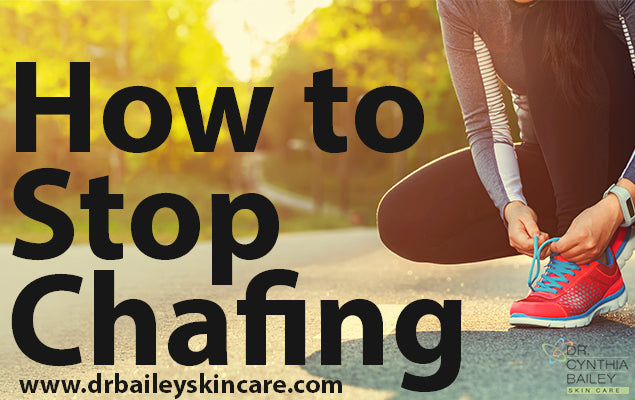How to Stop Chafing

Feel good in your skin year-round with these dermatologist’s tips
Cold weather is here, and in addition to dry, chapped skin, you also need to deal with chafing. If you exercise a lot, you may experience that uncomfortable, burning or rubbed-raw feeling. The good news is that there is a way to stop your skin from chafing.
What causes chafing?
It’s a combination of friction and moisture. When you do consistent movement like running, using an elliptical machine, treadmill, bike, or something else, the material of your clothing rubs against your skin repeatedly. Plus, sweat adds to the equation creating skin that is rubbed raw and chafed.
How do you stop chafing?
The key is to use the right products for prevention.
Look for a friction-defense product with caprylic or capric triglyceride as one of the leading ingredients.
This provides a light, silky feel on the skin. It also reduces friction from both skin and fabric without a greasy feel.
Silicone related ingredients such as cyclomethicone and dimethicone will also help.
They form a protective barrier over skin and reduce friction by helping adjacent fabric and skin to slip and slide instead of rub, scratch and abrade.
Look for products with moisturizing properties that can help to heal areas that are already chafed and rubbed raw.
In addition, I like to use 100% natural ingredients whenever possible to reduce chemical contact for the sensitive skin of skin folds. For example,
- bees wax,
- grape seed oil,
- shea butter, and
- coconut oil can be helpful and are found in some anti-chafing products.
They are moisturizing and can help reduce friction.
Avoid chafing products with natural ingredients that can be allergens.
Be careful. Some natural ingredients like,
- peppermint,
- calendula, and
- lemongrass.
These are some of the natural ingredients in chafing products that can potentially cause allergic rashes in people who are sensitive to them.
Avoid other natural ingredients that can be both allergens and irritants such as tea tree oil.
Tee tree oil is a wonderful, natural ingredient and has anti-fungal and antibacterial properties that also treat minor cuts, scrapes and other abrasions. It can be too harsh for sensitive skin fold skin, however.
To avoid an allergic reaction, don't apply these products to skin folds or chafed skin that has not healed. These areas are potentially too vulnerable and have increased absorption of product ingredients.
Use Natural Products to Prevent and Heal Chafing
Your daily skin care will help keep your skin healthy so it can better resist chafing. If you have chafing, or know someone who does, why not check out some of my natural products made especially for sensitive skin that will help chafed skin heal?
Swap out all of your general body care products to natural ones free from fragrance, allergens and irritants:
My All-Natural Shower Gel is an excellent hypoallergenic and totally fragrance-free skin cleanser for the shower.
Avoid phthalates, artificial dyes, formaldehyde-containing preservatives, parabens and other notorious chemicals with these daily-use dermatologist-approved shower gel and moisturizers.
Natural moisturizers to help skin heal and prevent chafing include:
- My Natural Body Butter (made with organic healing shea butter, aloe vera, plus apricot, avocado and sunflower oils), and
- Natural Lotion (formulated with organic aloe vera, sunflower oil, coconut oil and glycerin).

My Natural Lip Balm helps prevent lip chapping and "addiction" to lip balm (allergic dry lips from lip balms made with allergens that cause lip chapping).



